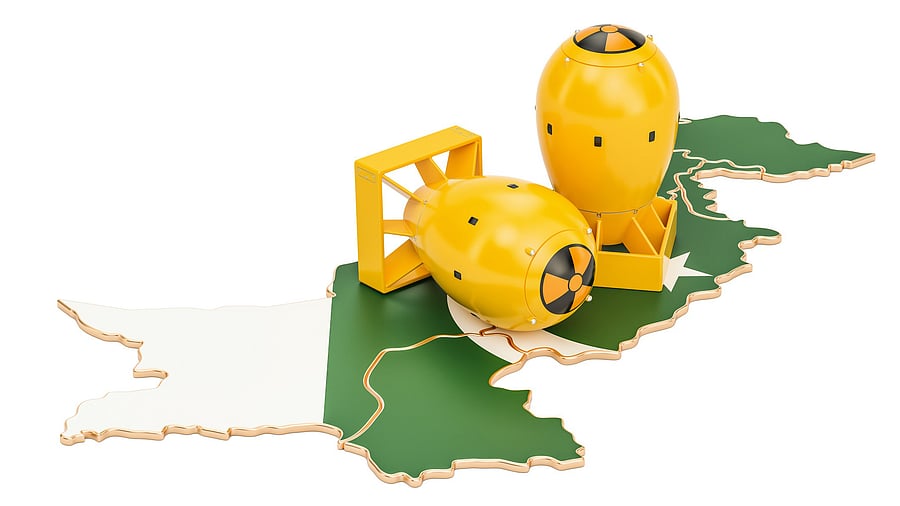
Representative image showing nuclear bombs on a 3-D rendering of the Pakistan map
Credit: iStock Photo
New Delhi: Pakistan is modernising its nuclear arsenal, and its programme to manufacture weapons of mass destruction is dependent primarily on technology and material from China, according to a report by the Defence Intelligence Agency of the United States.
The report underlined that Pakistan would continue to develop battlefield nuclear weapons to offset the conventional military advantage of India.
“Foreign materials and technology supporting Pakistan’s WMD (Weapons of Mass Destruction) programs are very likely acquired primarily from suppliers in China, and sometimes are transhipped through Hong Kong, Singapore, Türkiye, and the United Arab Emirates,” Lt Gen Jeffrey Kruse, the Director of the Defence Intelligence Agency, wrote in a report prepared for Armed Services Subcommittee on Intelligence and Special Operations of the US House of Representatives.
The report came out in the public domain even as India and Pakistan, just a fortnight back, stepped back from the brink of a war and reached an understanding to halt a four-day-long cross-border military offensive and counter-offensive.
United States President Donald Trump claimed credit for the ‘ceasefire’, which, according to him, had been brokered by his administration in order to prevent the death of millions of people in a “bad nuclear war” between India and Pakistan.
New Delhi, however, dismissed the US president’s claim and stressed that the proposal for halting the cross-border offensives had come from Islamabad on May 10 after Pakistan’s airbases and other military installations had suffered severe damage due to missile and drone strikes by India.
Trump’s comment on May 12, however, indicated that it was the fear of a nuclear conflict in South Asia that prompted the US to step up its efforts to make India and Pakistan stop the cross-border military actions. Prime Minister Narendra Modi, however, said on the same day that no “nuclear blackmail” would henceforth thwart India’s strong response against cross-border terrorism being promoted by Pakistan.
“Pakistan is modernising its nuclear arsenal and maintaining the security of its nuclear materials and nuclear command and control,” the director of the Defence Intelligence Agency noted in his “2025 Worldwide Threat Assessment” report. “Pakistan almost certainly procures WMD applicable goods from foreign suppliers and intermediaries.”
The Stockholm International Peace Research Institute in June 2024 reported that India’s nuclear warheads had increased to 172 from 164 in 2023. Pakistan’s nuclear warhead, however, remained stagnant at 170.
“Pakistan primarily is a recipient of China’s economic and military largesse, and Pakistani forces conduct multiple combined military exercises every year with China’s PLA (People’s Liberation Army), including a new air exercise completed in November 2024,” according to the report by the US DIA.
It also noted that Pakistan regarded India as “an existential threat” and would continue to pursue its military modernisation effort, including the development of battlefield nuclear weapons, to offset the conventional military advantage of India.
Pakistan, like India, is neither a signatory to the Nuclear Non-Proliferation Treaty nor a member of the Nuclear Suppliers Group.
China's support to nuclear programme of Pakistan dates back to the 1960s and, over the past couple of decades, extended to areas like nuclear fuel mining and exploration, supply of nuclear warhead designs, enriched fuel, transfer of dual use technology and materials for the development of nuclear weapons, delivery systems for nuclear weapons and training of the scientific personnel, a source told DH in New Delhi.
New Delhi has been closely monitoring Islamabad's pursuit of developing low-yield and short-range tactical nuclear weapons designed for use against opposing troops on the battlefield. The military planners in New Delhi have taken into account Islamabad's move to deploy such weapons as a deterrent against India’s military offensives against Pakistan. As the tactical nuclear weapons are more portable and mobile, the US has been worried about the possibility of such weaponry falling into the hands of terrorists in Pakistan.
